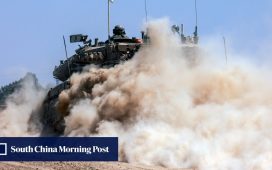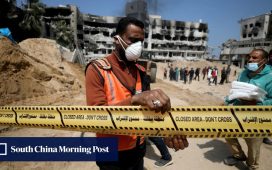
Israeli police stormed the al-Aqsa mosque in Jerusalem’s Old City, firing stun grenades at Palestinian worshippers in a move that drew widespread international criticism and raised tensions as Muslims mark Ramadan and Jews prepare to begin Passover.
Palestinian militants in Gaza responded with rocket fire on southern Israel, prompting repeated Israeli airstrikes.
Palestinian Red Crescent medics said that at least 50 people had been injured. Israeli police said 350 were arrested.
Turkey’s president, Recep Tayyip Erdogan, condemned the Israeli police raid as a “vile act”, adding: “Putting a hand on al-Aqsa mosque and trampling on the sanctity of the Haram al-Sharif is a red line for us.”
Canada’s president, Justin Trudeau, criticised the Israeli government’s “inflamed rhetoric” and said: “We deplore what’s going on right now in Israel.”
But while Israeli prime minister Benjamin Netanyahu said Israel was working to “calm tensions”, his far-right security minister Itamar Ben-Gvir has called for a harsh response to the Hamas rocket attacks, tweeting: “It’s time to rip heads off in Gaza.”
The mosque sits in a hilltop compound sacred to both Jews and Muslims, and conflicting claims over it have spilled into violence before, including a bloody 11-day war between Israel and Hamas, the Islamic militant group that rules Gaza. Al-Aqsa is the third-holiest site in Islam, and stands in a spot known to Jews as the Temple Mount, which is the holiest site in Judaism.
Israel’s police chief is already facing calls to be sacked after he was heard in a leaked recording saying that Arabs in the country have a murderous “nature”. Kobi Shabtai allegedly made the racist remark in a private meeting with Mr Ben-Gvir last week. “They kill each other,” he told the minister. “That is their nature. That is the mentality of the Arabs.”
Palestinians responded with fury to the mosque raid
(AFP via Getty)
UN Middle East envoy Tor Wennesland said he was “appalled by the images of violence” at al-Aqsa, condemning the beating and mass arrests of Palestinians as well as reports of Palestinians stockpiling firecrackers and rocks.
People who were detained at the compound and later released said police had used batons, chairs, rifles and whatever else they could find to strike Palestinians, including women and children, who responded by hurling stones and setting off firecrackers that they’d brought to evening prayers in anticipation of possible clashes. Outside the mosque’s gate, police used stun grenades and rubber bullets to disperse crowds of young men.
Most of the Palestinians arrested at al-Aqsa were released from detention by the early afternoon, said lawyer Khaled Zabarqa, who represents several of them.
Crowds of Palestinians gathered around a police station in Jerusalem on Wednesday, waiting anxiously for their loved ones to be released. Amin Risheq, a 19-year-old from East Jerusalem, said that after being beaten and forced to lie on the floor of the mosque with dozens of others, his hands zip-tied behind his back, he was taken to the police station, where he claims not to have had access to a toilet, medical attention or water for over six hours.
“They treated us like animals,” he said.
Israeli police walk inside the al-Aqsa mosque compound on Wednesday
(AFP via Getty)
Since Ramadan began on 22 March, scores of Muslim worshippers have repeatedly tried to stay overnight in the mosque, a practice typically permitted only during the last 10 days of the holiday. Israeli police have entered nightly to evict the worshippers.
Mr Netanyahu says he is committed to preserving the shared arrangement at the compound, but he described the worshippers who locked themselves in the mosque as “extremists” who had prevented Muslims from entering the mosque peacefully.
Jews are permitted to visit the compound, but not to pray there, under the long-standing agreement. But such visits, which have grown in numbers in recent years, have often raised tensions, particularly because some Jews are often seen quietly praying.
Reuters and Associated Press contributed to this report













